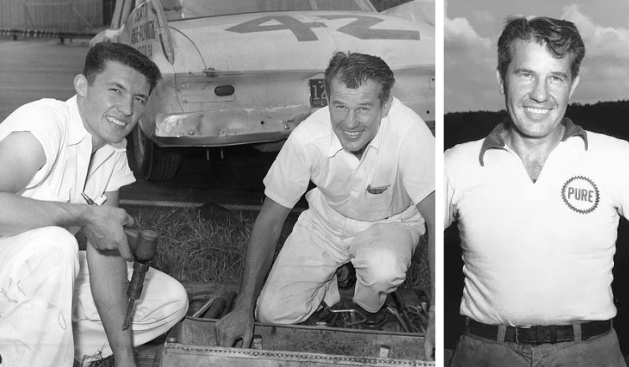Celebrity
The Life and Achievements of Lee Petty American Motorsports Racing Legend

Lee Petty was one of the most influential figures in the history of American motorsports. With a career that spanned over two decades, Petty became synonymous with the rise of NASCAR and stock car racing in the United States. His competitive spirit, technical skill, and contributions to the sport’s development solidified his place as a motorsports legend.
Quick Bio
| Attribute | Detail |
|---|---|
| Full Name | Lee Arnold Petty |
| Date of Birth | March 14, 1914 |
| Place of Birth | Randleman, North Carolina |
| Date of Death | April 5, 2000 |
| Nationality | American |
| Career Start | 1949 |
| Retirement | 1964 |
| Major Achievements | 3-time NASCAR Grand National Champion |
| Notable Cars | 1959 Plymouth, 1962 Chrysler |
| Legacy | Founding figure of NASCAR’s early years |
Early Life and Introduction to Racing

Lee Petty‘s story began in Randleman, North Carolina, where he was born into a family with modest means. His interest in motorsports began early, but it wasn’t until the late 1940s that Petty truly immersed himself in the sport. In the early days of racing, the sport was far less organized than it is today. Stock car racing was a way of life for many people, and it was a natural progression for Petty to step into the driver’s seat.
Petty’s first car was a Ford, but he soon made the switch to a Plymouth, which would become the hallmark of his success. Racing was far more dangerous during this time, and the conditions were often rough, but Petty’s grit and resilience made him stand out. Despite the challenges, his ability to navigate the tracks and his consistent performance earned him recognition early on.
Career Milestones and Achievements

Lee Petty’s racing career is marked by a series of groundbreaking achievements that helped shape NASCAR into the premier racing series it is today. Petty won his first Grand National race in 1950, marking the start of what would be a remarkable career.
However, it was during the 1950s that Petty truly established himself as a force in motorsports. He clinched his first NASCAR Grand National Championship in 1954, a feat he would repeat in 1958 and 1959, making him one of the most dominant drivers of his era. Lee Petty’s championships were not just victories; they represented a turning point in the history of American racing.
Petty was a pioneer in making NASCAR racing more professional, from organizing race schedules to promoting a stronger sense of camaraderie among drivers. He wasn’t just a competitor; he was a leader within the sport, known for his precision and his ability to read the race.
Racing Legacy: The Petty Family Dynasty

One of the most significant aspects of Lee Petty’s legacy is the lasting influence of his family on the sport. His son, Richard Petty, would go on to become one of NASCAR’s most successful and beloved figures, winning a record seven NASCAR championships. The Petty family has played a central role in NASCAR history, and Lee’s role as a patriarch cannot be overstated. Richard Petty would also follow in his father’s footsteps and race for Petty Enterprises, the team founded by Lee.
Together, Lee and Richard Petty helped elevate the Petty name to one of the most respected in motorsports. Their contribution to the growth of NASCAR is immeasurable. The Petty legacy lives on not only through Lee’s son but also through his grandson, Adam Petty, who continued the family tradition of racing.
Influence on Stock Car Racing
Lee Petty was not just a driver; he was an innovator who contributed to the development of stock car racing. In the early days, stock cars were often modified from regular production models. Petty helped to push the sport in a direction that embraced the technical aspects of racecars. He worked alongside engineers to improve car safety and performance. Plymouth and Chrysler, which were the brands that Lee frequently raced, benefited from this collaboration.
Petty’s influence on racing is also seen in his involvement with the NASCAR Hall of Fame, where he is enshrined as one of the sport’s pioneers. His role in shaping the early days of the sport helped set the stage for NASCAR’s rapid growth in the 1960s and beyond.
Racing Style and Personality
Petty’s racing style was characterized by a combination of aggression and calculated precision. He understood the importance of not only speed but also strategy. Races in Petty’s era were grueling, requiring mental and physical endurance. Lee’s ability to adapt to changing race conditions and his remarkable consistency on the track set him apart from his peers.
Off the track, Petty was known as a reserved, humble man who preferred to let his driving do the talking. While other drivers of his era sought the limelight, Petty was content with his accomplishments. His modesty was a trait that earned him the respect of his competitors and fans alike.
The 1960 Daytona 500 Victory
One of the highlights of Lee Petty’s career was his victory in the 1960 Daytona 500, a race that would go down in history as one of the closest finishes in NASCAR history. The race ended in controversy, with Petty initially finishing in second place, only to be declared the winner after a review of the film footage. This dramatic finish cemented Petty’s place in NASCAR lore.
The victory was significant for several reasons: it marked his first Daytona 500 win, a prestigious achievement, and it demonstrated his tenacity and never-give-up attitude. The race was a defining moment in his career and a testament to his ability to excel under pressure.
Early Contributions to NASCAR’s Growth
Lee Petty was instrumental in helping NASCAR grow into the sport it is today. As one of the first drivers to achieve sustained success in the series, Petty played a pivotal role in drawing attention to stock car racing. His achievements helped raise the profile of NASCAR, especially in the southeastern United States, where the sport was gaining popularity.
In the years following his early wins, Petty became a spokesperson for the sport. He helped establish the NASCAR Foundation and worked tirelessly to promote the series to a wider audience. His efforts contributed significantly to the recognition of NASCAR as a major motorsports entity, paving the way for the likes of Dale Earnhardt, Jeff Gordon, and others.
Retirement and Post-Racing Life
Lee Petty’s career came to an end in 1964, after he suffered serious injuries in a racing accident. Although the accident forced him into retirement, it did not mark the end of his involvement in the sport. After retiring, Petty continued to be a key figure in the NASCAR community, serving as a mentor to younger drivers and offering advice to the next generation of racers.
In the years following his retirement, Petty’s legacy continued to grow. He was often invited to attend races and events, where he would reflect on the early days of NASCAR and share stories about his time on the track. His contributions to the sport were honored in many ways, and he remained a beloved figure in the racing community until his passing in 2000.
Recognition and Awards
Over the course of his career, Lee Petty was recognized with numerous awards and honors. He was inducted into the NASCAR Hall of Fame in 2010, a fitting tribute to his role in the sport’s history. Additionally, he was named one of the 50 Greatest Drivers of All Time by NASCAR in 1998.
Petty’s name continues to resonate with racing fans around the world, and his story is often cited as an example of determination and perseverance. His legacy remains firmly embedded in the fabric of NASCAR and motorsports in general.
Conclusion
Lee Petty’s impact on motorsports cannot be overstated. His accomplishments on the track, coupled with his contributions to the sport’s growth and development, solidified his place as a true racing legend. Through his pioneering spirit, racing style, and leadership within the sport, Lee Petty helped lay the foundation for what NASCAR has become today.
His influence lives on through his son, Richard Petty, and his grandchildren, who have carried the Petty name forward in the world of motorsports. Lee Petty’s career serves as a testament to the resilience and determination required to succeed in one of the most challenging sports in the world.
FAQs
What was Lee Petty’s most significant achievement in NASCAR?
Lee Petty’s most significant achievement was winning three NASCAR Grand National Championships and his iconic 1960 Daytona 500 victory.
When did Lee Petty retire from racing?
Lee Petty retired in 1964 after suffering injuries in a racing accident.
What is Lee Petty’s legacy in NASCAR?
Lee Petty’s legacy lies in his pioneering role in the growth of NASCAR, his numerous championships, and his influence on the development of the sport. His family’s continued involvement in NASCAR also strengthens his lasting impact.
Who was Lee Petty’s most famous family member in racing?
Lee Petty’s son, Richard Petty, is perhaps the most famous family member, holding the record for seven NASCAR championships.
How did Lee Petty impact stock car racing?
Lee Petty helped professionalize stock car racing and was a driving force behind NASCAR’s development into the major motorsports series it is today.
More Info And Buzz Visit: Dodge Buzz
-

 Celebrity9 months ago
Celebrity9 months agoWho Is Steve Cena? All About John Cena’s Brother and His Life
-

 Uncategorized9 months ago
Uncategorized9 months agoWho is Janet Gayle? All About Gary Burghoff’s Ex-Wife
-

 Celebrity9 months ago
Celebrity9 months agoWho is Nadia Farmiga? All You Need to Know About Vera Farmiga’s Sister
-

 Celebrity9 months ago
Celebrity9 months agoWho Is Samuel Nowlin Reeves Jr.? The Untold Biography of Keanu Reeves’ Father




















